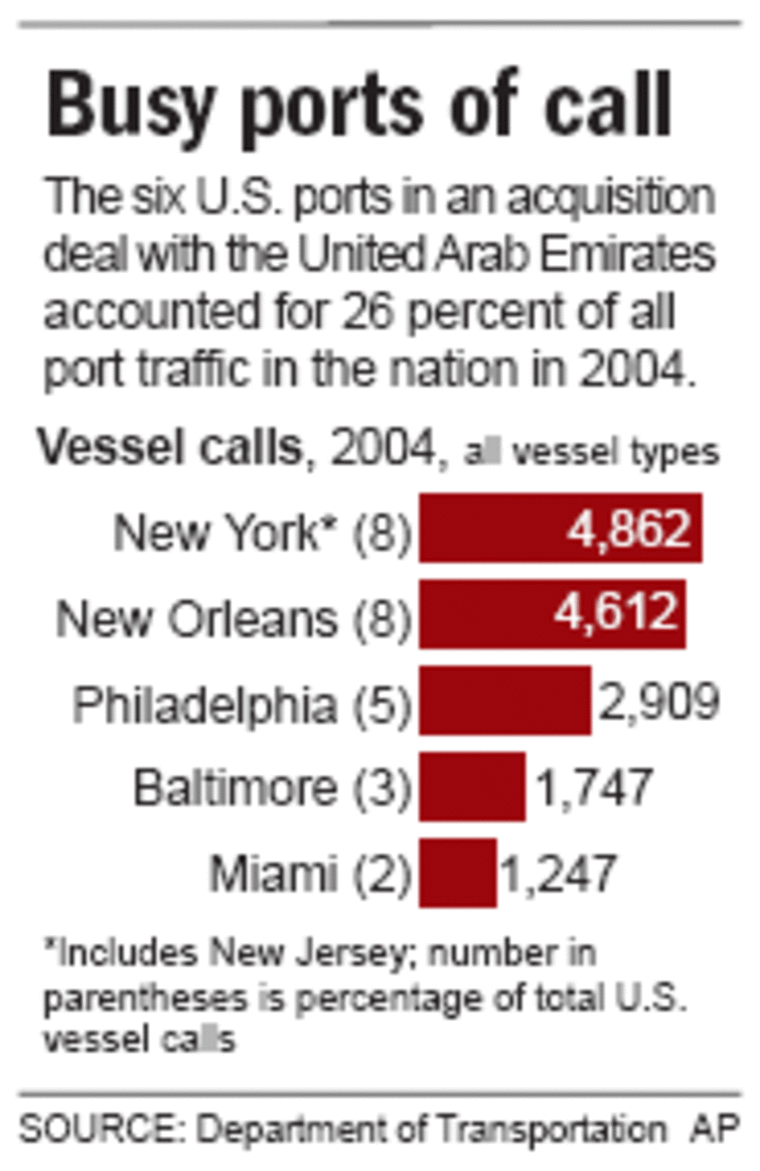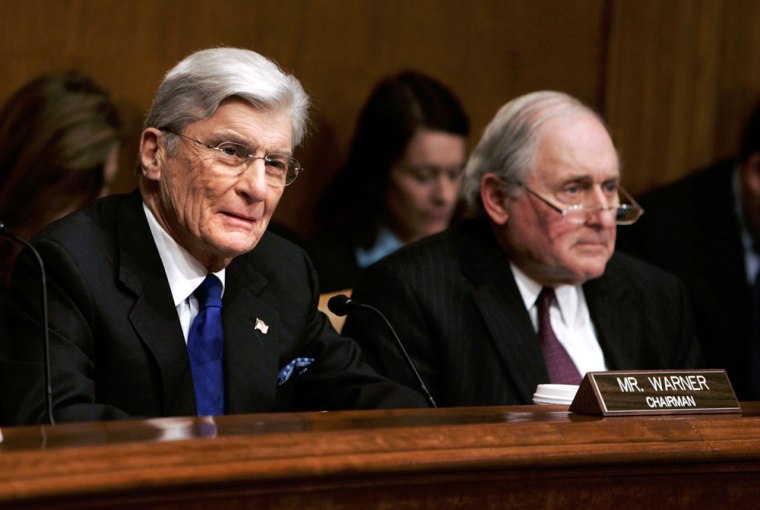At a Senate Armed Services Committee briefing Thursday on whether a Dubai-based company should be allowed to acquire leases of terminal facilities at six U.S. ports, both Sen. Hillary Clinton, D-N.Y., a critic of the deal, and committee chairman Sen. John Warner, R-Va., who is not opposed to it, pointed to a compromise that might avoid a confrontation with President Bush.
The possible way to defuse the conflict: a new 45-day re-investigation by the inter-agency group, the Committee on Foreign Investment (CFIUS) to re-examine the national security implications of the deal. “That may be the first step in trying to resolve this matter,” Clinton said.
And in a signal of conciliation from the president, his political advisor Karl Rove told Fox News that the White House would accept a small delay in completing the deal in which Dubai Ports World, a government-owned entity in the United Arab Emirates, is acquiring London-based Peninsular and Oriental Steam Navigation Co., which holds long-term leases on terminal facilities at six East Coast ports.
“Yes, look, there are some hurdles, regulatory hurdles, that this still needs to go through on the British side as well that are going to be concluded next week.... There’s no requirement that it close, you know, immediately after that,” Rove said.
White House spokesman Scott McClellan said Wednesday that Rove's office "was not involved in this process" of reviewing the Dubai deal. But Rove's comment Thursday indicated he is now seeking a solution to what has become a political problem for Bush.
With the idea of a new 45-day review floated as a possible solution, Deputy Treasury Secretary Robert Kimmitt told the senators that CFIUS has already conducted a thorough investigation, one that started informally last October and ended on Jan. 17.
U.S. intelligence agencies did their review of the proposed deal last year before the Dubai firm formally filed its CFIUS request, Kimmitt said.
None of the officials serving on the interagency CFIUS panel raised national security objections. The panel included officials from the Defense Department and the Department of Homeland Security.
National security concerns
National Security “concerns were raised; they were resolved. If they hadn’t been resolved, then the national security could have been affected,” Kimmitt told Sen. Carl Levin, D- Mich.

Levin said the Bush administration had failed to do a 45-day review which he said was mandatory under the Exon-Florio law.
Congress enacted the Exon-Florio law in 1988 to set up the process to scrutinize foreign companies’ acquisitions of U.S. firms.
Warner wondered whether there’d be a way to allow Congress to hold further public hearings on the deal, which is set to become final next Thursday.
“Is there an allowance in flexibility to allow these hearings to go forward without impairment in the contractual relations?” Warner asked Kimmitt, who replied that he’d have to check with Dubai Ports World to seek an answer.
Heading off legislation
Warner seemed to see more congressional hearings as a way to head off any legislation. “As a result of those steps, I’m hopeful that this thing can be resolved,” Warner told Kimmitt. As for legislation ordering the deal to be delayed, Warner said, “Hopefully it wouldn’t come to that.”
If CFIUS does a new review, as Clinton and other senators want, it is not clear why the outcome would be any different from what it has already done.
At that point Congress would have to decide whether to pass a law blocking the deal. Bush has pledged to veto such a bill.
Sen. Charles Schumer, D- N.Y. and Rep. Peter King, R- N.Y. are proposing a bill that would require new 45-day CFIUS review and would give Congress the power to kill the deal within 30 days after getting a report on the deal from the Secretaries of Homeland Security and the Treasury.
Meanwhile a group of senators including Clinton is offering a different bill that would ban any foreign governments from controlling operations at American ports.
If Congress passed either bill and Bush, as he has promised, vetoed it, Congress could over-ride his veto by a two-thirds vote of both houses.
David Marchick, a former State Department official in the Clinton administration who is now a partner at the Washington, D.C. law firm of Covington & Burling, said he didn’t see any successful legal challenge to a law specifically banning the Dubai Ports transaction.
Problem with Schumer legislation
But of the Schumer proposal, he said, “I think the disapproval mechanism is one of the problems in this legislation.”
He pointed to the 1983 Supreme Court decision called INS v. Chadha which banned legislative vetoes of executive actions.
“If Congress passes a statute the president can either sign it or veto it, no Chadha problem. If the statute is set up so that the Congress is acting alone without presenting the bill to the president, it is unconstitutional under Chadha,” Marchick said.
Marchick has handled high-profile CFIUS transactions including cases involving a Chinese firm’s acquisition of IBM’s PC business and a Chinese firm’s acquisition of assets of the Global Crossing telecom firm.
Since, nearly 1,600 cases have gone before CFIUS. In only one case, in 1990, has a president ordered a foreign firm to divest its ownership of an American firm.
He said “there’s never been a CFIUS deal that has been undone by Congress.”
In many cases, a foreign firm seeking to do a deal subject to CFIUS review will, after consulting with Federal officials, revise the terms of the transaction in order to meet U.S. national security concerns.
He said of the CFIUS procedure: “It’s a very rigorous process; they put companies through the wringer on a regular basis.”
As for the manner in which the CFIUS panel reviewed the Dubai Ports World deal, he said, “I’d be very surprised if there’s anything in their review of this that didn’t follow normal process.”
Another lawyer who handles CFIUS cases, Christopher Corr of the Washington office of White & Case, wrote last month that if Congress were to give itself the power to kill deals OK’d by CFIUS it “would politicize the process of reviewing foreign bids, thus increasing volatility and political risk. It's also questionable whether lawmakers would bring to the review procedure any special knowledge and insight not yet provided by government officials who serve on CFIUS.”
